Seven new student chapters in China, Lithuania, Mexico, and the US were chartered at the May 22, 2025, ECS Board of Directors Meeting. The total number of chapters in our supportive, global community is up to 161 with these new additions! (more…)
ECSA Spotlight: Exploring the Future of Electrodeposition with Deep Eutectic Solvents
Posted on June 19, 2025 by Adrian Plummer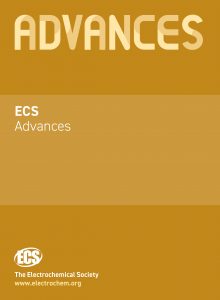 ECS Advances is proud to spotlight the article, “Challenges to the Adoption of Deep Eutectic Solvents in the Electrodeposition Industries,” by T. A. Green and S. Roy of the Department of Chemical and Process Engineering at the University of Strathclyde, Glasgow, UK. This thought-provoking contribution critically examines the barriers to widespread industrial adoption of deep eutectic solvents (DESs) in electrodeposition processes, an emerging area of great interest for sustainable electrochemical manufacturing.
ECS Advances is proud to spotlight the article, “Challenges to the Adoption of Deep Eutectic Solvents in the Electrodeposition Industries,” by T. A. Green and S. Roy of the Department of Chemical and Process Engineering at the University of Strathclyde, Glasgow, UK. This thought-provoking contribution critically examines the barriers to widespread industrial adoption of deep eutectic solvents (DESs) in electrodeposition processes, an emerging area of great interest for sustainable electrochemical manufacturing.
The authors provide a comprehensive overview of the scientific, technical, and regulatory challenges impeding the transition from traditional electrolytes to DESs, while also offering valuable insights into future research directions that could unlock DESs’ full potential. Their work serves as a crucial reference for researchers, industry professionals, and policymakers aiming to advance green electrochemistry. (more…)
Editorial Spotlight: Celebrating Dr. Fan Ren, Incoming JSS Editor-in-Chief
Posted on June 19, 2025 by Adrian Plummer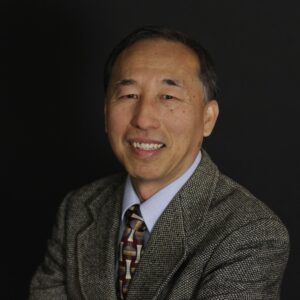 The Electrochemical Society (ECS) proudly announces the appointment of Dr. Fan Ren as the next Editor-in-Chief of the ECS Journal of Solid State Science and Technology (JSS), with his term beginning on January 1, 2026.
The Electrochemical Society (ECS) proudly announces the appointment of Dr. Fan Ren as the next Editor-in-Chief of the ECS Journal of Solid State Science and Technology (JSS), with his term beginning on January 1, 2026.
Dr. Ren is a Distinguished Professor in the Department of Chemical Engineering at the University of Florida and one of the world’s foremost experts in wide bandgap semiconductor devices and materials. His extensive scholarly record includes over 1,000 publications and more than 61,000 citations, underscoring the global impact of his research in electronic materials and device technologies.
Call for Nominations: JSS Technical Editor – Solid State Sensors
Posted on June 19, 2025 by Adrian Plummer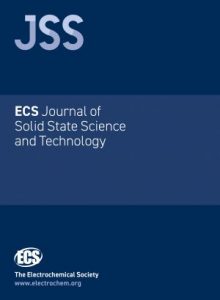 The ECS Journal of Solid State Science and Technology (JSS) welcomes nominations for the role of Technical Editor in the Solid State Sensors topical interest area. This editorial role is integral to maintaining the journal’s high standards of scientific excellence and ensuring the success of its publication efforts.
The ECS Journal of Solid State Science and Technology (JSS) welcomes nominations for the role of Technical Editor in the Solid State Sensors topical interest area. This editorial role is integral to maintaining the journal’s high standards of scientific excellence and ensuring the success of its publication efforts.
Scope of the role: solid state sensors
Areas of interest include sensors or devices based on physical and quantum transduction principles, as well as sensor advances focused on solid state principles. Specific areas of interest include novel development, characterization, implementation, fundamentals, and applications of physical and quantum sensors. Transduction mechanisms of interest include, but are not limited to, quantum, mechanical, mass sensitive, optoelectronic, optical, radiation, thermal, acoustic, piezoelectric, resistive, microwave, and magnetic. Specific topics include wearable devices, implantable devices, brain-computer interface, agricultural sensors, environmental sensors, (more…)
The Electrochemical Society Names Class of 2025 ECS Fellows
Posted on June 17, 2025 by Genevieve Goldy The Electrochemical Society (ECS) named 12 members to the 2025 Class of Fellows of The Electrochemical Society. This designation was established in 1989 to recognize advanced individual technological contributions to electrochemistry and solid state science and technology, and for service to the Society. These members are recognized for scientific achievements, leadership, and active participation in the Society. Each year, up to 15 renowned scientists and engineers are chosen by their peers for this honor.
The Electrochemical Society (ECS) named 12 members to the 2025 Class of Fellows of The Electrochemical Society. This designation was established in 1989 to recognize advanced individual technological contributions to electrochemistry and solid state science and technology, and for service to the Society. These members are recognized for scientific achievements, leadership, and active participation in the Society. Each year, up to 15 renowned scientists and engineers are chosen by their peers for this honor.
The 2025 ECS Fellows are (listed alphabetically): Thierry Brousse, Université de Nantes; Scott Calabrese Barton, Michigan State University; Uroš Cvelbar, Jožef Stefan Institute; Avetik R. Harutyunyan, Honda Research Institute USA, Inc.; Bing-Joe Hwang, National Taiwan University of Science and Technology; Ryoji Kanno, Institute of Science Tokyo; Xingbo Liu, West Virginia University; Radenka Maric, University of Connecticut; Nosang Myung, University of Notre Dame; Colm O’Dwyer, University College Cork; Jeff Sakamoto, University of California, Santa Barbara; and David Wilkinson, University of British Columbia.
The induction of the 2025 Class of ECS Fellows takes place on October 13, 2025, at the 248th ECS Meeting in Chicago, IL, USA.
Join us in congratulating our new ECS Fellows! (more…)
Join the 2025 Electrochemical Measurements Workshop at Case Western Reserve University
Posted on June 17, 2025 by Shannon Reed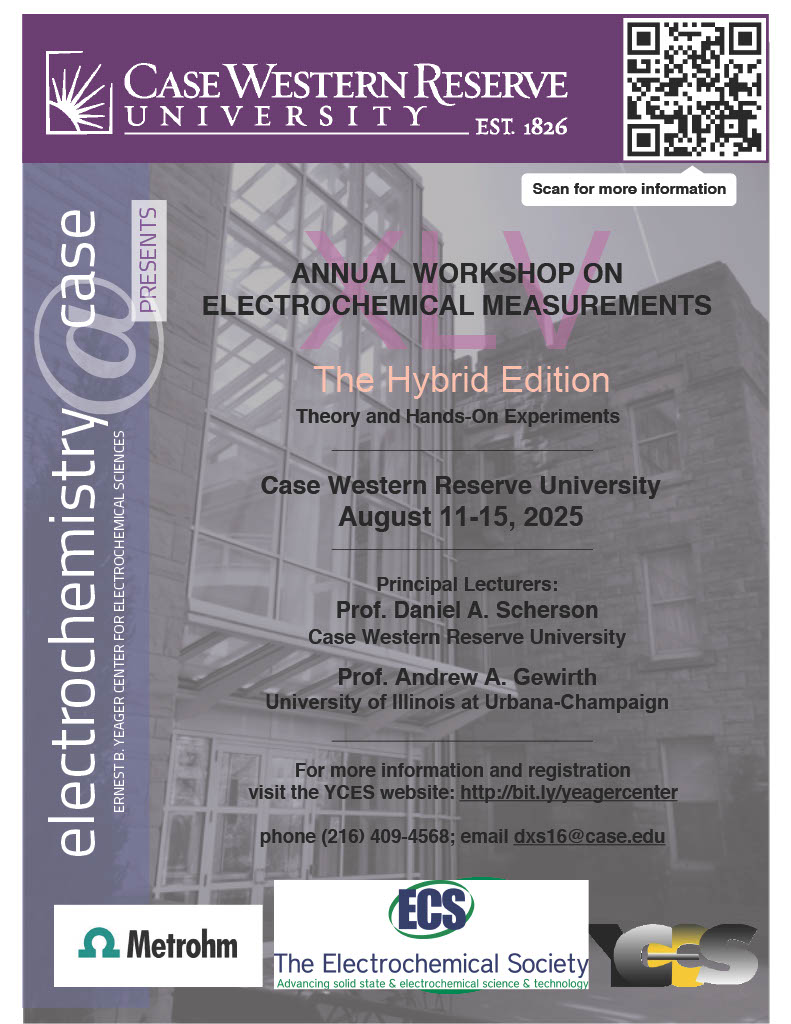 August 11-15, 2025 | Case Western Reserve University
August 11-15, 2025 | Case Western Reserve University
The Ernest B. Yeager Center for Electrochemical Sciences (YCES) at Case Western Reserve University hosts the 45th Annual Workshop on Electrochemical Measurements from August 11–15, 2025. The Electrochemical Society (ECS) is proud to serve as a name-only sponsor of this longstanding and impactful event.
Held on the Case Western Reserve campus in Cleveland, Ohio, this hybrid-format workshop provides a rare opportunity for academic, industrial, and government lab professionals to gain both theoretical and practical knowledge in the field of electrochemistry. With its faculty comprised of internationally recognized experts, the YCES Workshop has become a cornerstone event for deepening understanding of electrochemical science and its wide-ranging applications.
Call for Nominations: ECSSP Associate Editor – Electrochemical Sensors
Posted on June 16, 2025 by Adrian Plummer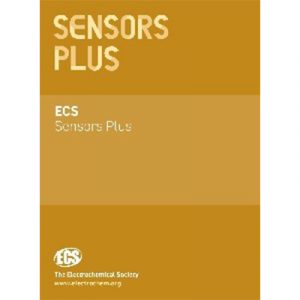 The Electrochemical Society (ECS) seeks nominations for the position of Associate Editor for ECS Sensors Plus in the electrochemical sensors topical interest area.
The Electrochemical Society (ECS) seeks nominations for the position of Associate Editor for ECS Sensors Plus in the electrochemical sensors topical interest area.
Ideal candidates possess and maintain authoritative expertise in the field of electrochemical sensors, as defined by the scope of the ECS Sensors Plus journal. This includes demonstrated experience in advancing sensor technologies and a commitment to scholarly excellence in peer-reviewed publishing.
The Associate Editor works closely with the journal’s Technical Editor and Editor-in-Chief to oversee the peer-review process, ensure scientific rigor, and uphold the high standards and editorial vision of ECS Sensors Plus.
Appointment details
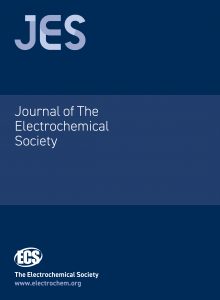 The Electrochemical Society (ECS) seeks nominations for the position of Associate Editor for the Journal of The Electrochemical Society (JES) in the electrochemical sensors topical interest area.
The Electrochemical Society (ECS) seeks nominations for the position of Associate Editor for the Journal of The Electrochemical Society (JES) in the electrochemical sensors topical interest area.
Nominees for this editorial position possess and maintain authoritative scientific knowledge in the field of electrochemical sensors as outlined in the ECS topical interest areas.
The Associate Editor works in support of the Technical Editor and Editor-in-Chief of JES to ensure rigorous peer review and uphold the quality and reputation of the journal.
Appointment details
Call for Nominations: JSS Technical Editor – Electronic and Photonic Devices and Systems
Posted on June 16, 2025 by Adrian Plummer The ECS Journal of Solid State Science and Technology (JSS) welcomes nominations for the role of Technical Editor in the Electronic and Photonic Devices and Systems topical interest area. This critical editorial role is integral to maintaining the journal’s high standards of scientific excellence and ensuring the success of its publication efforts.
The ECS Journal of Solid State Science and Technology (JSS) welcomes nominations for the role of Technical Editor in the Electronic and Photonic Devices and Systems topical interest area. This critical editorial role is integral to maintaining the journal’s high standards of scientific excellence and ensuring the success of its publication efforts.
Scope of the topic
The scope of the topic is fundamental properties and measurements of device fabrication and characteristics for electronic and photonic applications. Specific topics include thin film transistors, MOSFETs, bipolar devices, quantum devices, silicon, germanium, and related microelectronic and photonic devices, micro- and nano-electro-mechanical systems (MEMS and NEMS), solid state sensors, wide bandgap semiconductor materials and devices, photovoltaic energy conversion devices, memories, graphene-based devices, plasmonics, power devices, silicon-on-insulator devices, and bioelectronics. (more…)
JSS Spotlight: “A CMOS-Compatible Si Nanowire Resistance Temperature Sensor Based on Low-Temperature-Processed ZnO Layer”
Posted on June 11, 2025 by Adrian Plummer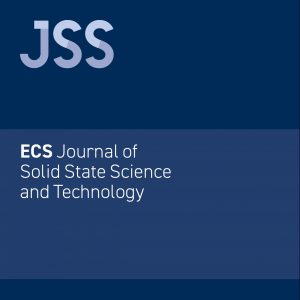 Join us in celebrating the authors of the article, “A CMOS-Compatible Si Nanowire Resistance Temperature Sensor Based on Low-Temperature-Processed ZnO Layer,” for achieving top-read status in the ECS Journal of Solid State Science and Technology this week!
Join us in celebrating the authors of the article, “A CMOS-Compatible Si Nanowire Resistance Temperature Sensor Based on Low-Temperature-Processed ZnO Layer,” for achieving top-read status in the ECS Journal of Solid State Science and Technology this week!
Authored by Darragh Buckley, Alex Lonergan, and Colm O’Dwyer, this innovative study explores the integration of a ZnO-coated silicon nanowire sensor fabricated through a CMOS-compatible process. With its excellent temperature sensitivity and low thermal budget, this work offers promising applications in the field of advanced microsystems and wearable electronics. (more…)


